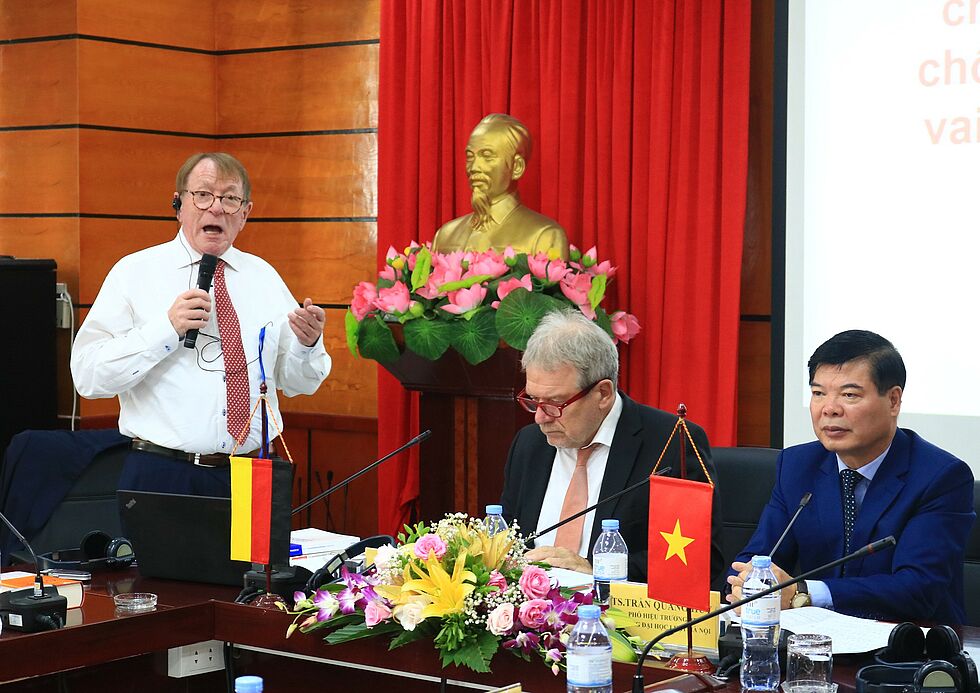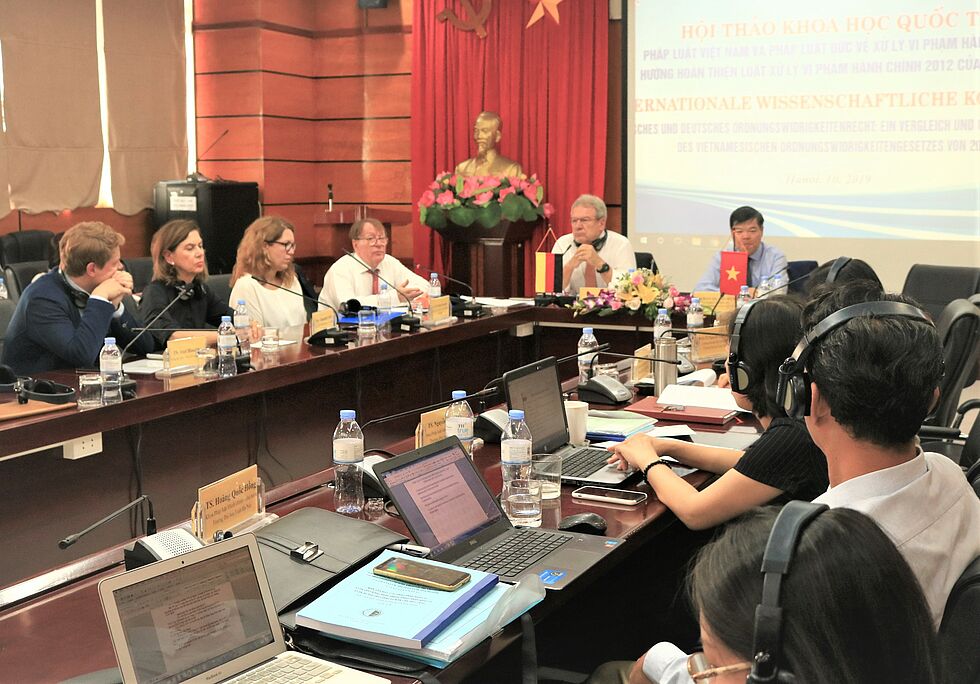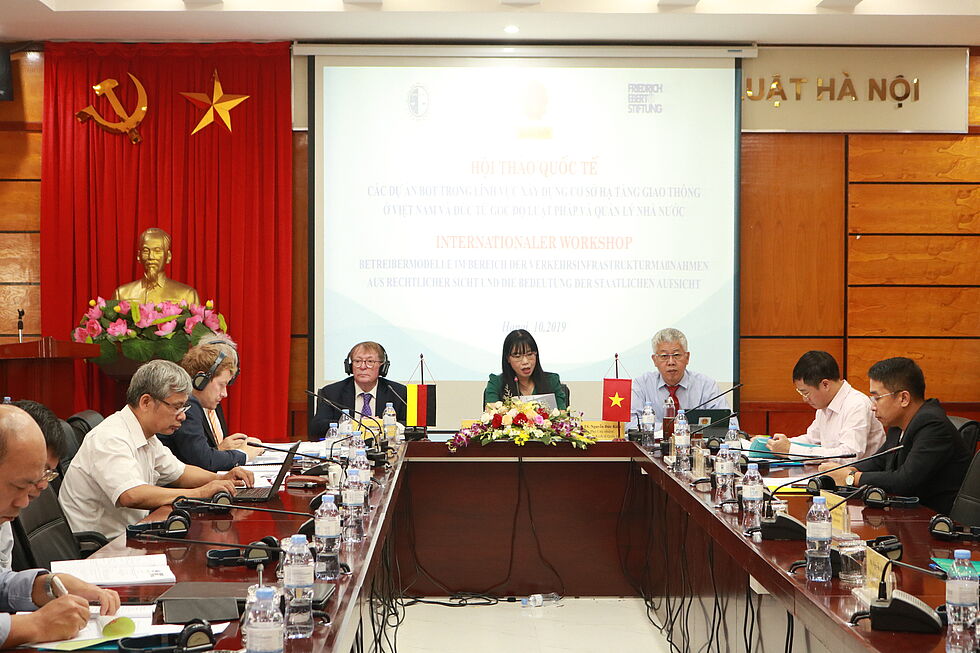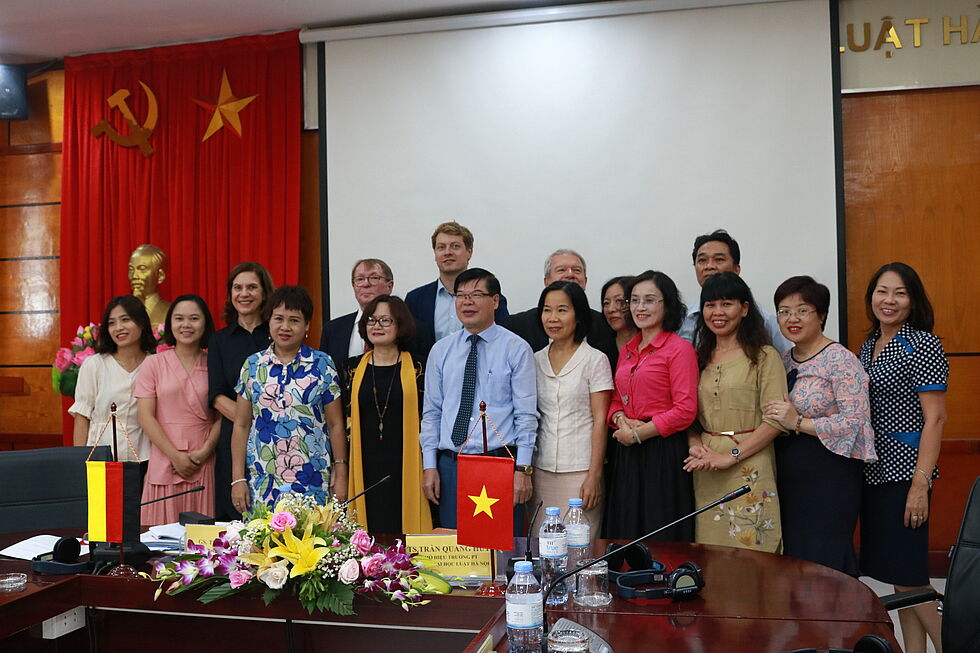Handling of administrative violations – The call for more constructive measures
Engaging discussion and analysis on setbacks of a fragmented Law on handling of administrative violations|© FES Vietnam
In 2012, Vietnam promulgated Law on Handling of Administrative Violations, which for the past seven years has proved several weak points. A vast number of decrees was issued by the government to interpret the Law’s general wording to deal with particular offences and their sanctioning. However, authorities have struggled to keep track of these derivative provisions, which hinders effective law enforcement. As the Ministry of Justice recognized the need for a consistent legal framework, in 2018, it put administrative violations back on the agenda, encouraging authorities, legal experts and legal practitioners to put forward recommendations for a new law.
Responding to this incentive, Friedrich-Ebert-Stiftung Vietnam (FES) and Hanoi Law University (HLU) dedicated their 9thVietnamese-German Law Days 2019 to the revision of 2012 Law on Handling of Administrative Violations. From September 30 – October 4, 2019, legal experts from Vietnam and Germany jointly developed ideas on how to improve Vietnamese regulations in the course of conferences, workshops and lectures in Hanoi and Ho Chi Minh City. The annual event is part of the Rule of Law Dialogue between the countries.
What is problematic?
As the Vietnamese presentations brought to light, difficulties are diverse. Fragmentary regulations of 2012 Law lack a clear line that helps authorities to implement them decently, giving public officials a lot of power. Additionally, society seems to be split over the proper range of sanctions. While some want them stricter to effectively deter people from violating the law, others fear that people then might only put a greater effort in concealing their infringements. Participants agreed that contemporary sanctions are arbitrary and do not match the gravity of violations. Therefore, Dr. Nguyễn Ngọc Bích (HLU) requested policymakers to pass a uniform list of violations with corresponding sanctions as to ensure legal certainty for both, authorities and citizens.
Before speaking of the flaws, Dr. Trần Thị Hiền (HLU) pointed out advantages of dealing with administrative violations by means of administrative procedure instead of court proceedings. “It enables authorities to handle an offence quickly and flexibly. However, arbitrary acts of authorities are hard to supervised.” She recommended adopting a mixed procedure in the future. In addition, under applicable Vietnamese law, a hearing of the accused is not in any case compulsory, future legislation must make it easier for citizens to exercise their rights and explicitly guarantee access to court.
Whereas in Germany, a judge is obliged to interpret an ambiguous provision, in Vietnam only the Standing Committee of the National Assembly is allowed to do so. The court, meanwhile, is limited to decide whether a penalty decision will be suspended or not. If the court considers the underlying provision unconstitutional, it can give notice to the authorities but must apply it anyway. Vietnam, unlike Germany, has no constitutional court to revise such a provision and declare it void. “In a changing society, generally it should be possible to adjust provisions to new conditions”, Prof. Dr. Fritz (Justus-Liebig-Universität Gießen) said referring to judge-made case law. “For our future dialogue it might be very interesting to talk about where in Vietnamese law a scope for interpretation could be useful or desirable.”
Another issue that kept coming up was the principle of discretionary prosecution in Germany. It enables authorities and the court to dismiss a case at any stage of the proceedings whereas in Vietnam authorities have no choice but to prosecute, even if the actual public interest in prosecution is minor. The experts debated whether this instrument might be useful for Vietnam as well. Advantages were seen in its flexibility and that authorities can make use of their resources more efficiently. Moreover, it might protect an accused person from disproportionate prosecution measures.
Rounding off the topic, Prof. Dr. Keßler (HTW Berlin) gave a broad overview on German cartel law, “Competition must be fair in order to unfold its advantages and cartel law is a powerful tool to ensure this. This might be relevant for Vietnam in its current situation as well”.
The next part of the event changed the subject to Vietnam's rising infrastructure projects and their implementation. Legal experts and ministry representatives debated the pros and cons of Build-Operate-Transfer (BOT) and other Public-Private-Partnership (PPP) projects. On the one hand, due to lack of available funds, it is important to attract investors with fixed and reliable legal provisions. On the other hand, the quality of these projects must come under effective scrutiny and contentment of citizens. In order to fairly balance all the interests at stake, among others, four major recommendations were phrased: Competitive tendering procedures have to become more transparent and fair, functional control mechanism have to be established, charge policy has to be adjusted, and citizens have to be enabled to participate at an early stage of the planning procedure.
“This conference serves everyone's interest”, as Prof. Dr. Keßler put it. “Also in Germany experts did not solve every problem yet, that is why exchange is the most important. Only by means of asking each other questions, we can try to approach the right answers. It is always a continuous learning process“. Dr. Trần Quang Huy (Acting Rector of HLU) recognized success of the event with closing remarks full of potentials: “A few contributions will be chosen and published as HLU aims at step-by-step establishing a law journal”.
This year Law Days did not only culminate in extensive exchange of legal expertise and ongoing practices between Vietnam and Germany, but also created an international platform for assessments and ideas to be made for Vietnamese new Law on handling of administrative violations in particular and for betterment of Vietnamese legal landscape in general.






